Diuina Eloquia cum Legente Crescunt: Does Gregory the Great mean a subjective or an Objective or an Objective Growth?
Journal title RIVISTA DI STORIA DELLA FILOSOFIA
Author/s Pol Vandevelde
Publishing Year 1993 Issue 2003/4
Language English Pages 26 P. File size 123 KB
DOI
DOI is like a bar code for intellectual property: to have more infomation
click here

FrancoAngeli is member of Publishers International Linking Association, Inc (PILA), a not-for-profit association which run the CrossRef service enabling links to and from online scholarly content.
<i> Diuina Eloquia cum Legente Crescunt Does Gregory the Great Mean a Subjective or an Objective Growth? </i> (di Pol Vandevelde) - ABSTRACT: The article offers a new account of the famous statement by Gregory the Great that the text of the Bible grows with the reader. While most commentators understand this as a subjective growth of the reader enriched through reading, few give an account of the objective growth, namely, that the text itself grows. By focusing on the Homilies on Ezekiel and using at times the Morals on the Book of Job, I link the statement diuina eloquia cum legente crescunt to Gregory’s use of the different senses of the Bible and show that the statement means not only a subjective growth of the reader, but also an objective growth of the text. Such a mutual growth takes the form of a cooperation between text and reader. It is from within such cooperation that the senses of the biblical text have to be found and understood. The literal meaning is thus foundational, as the basis for the other senses, but only within the cooperation, since readers must know in advance of what the literal meaning is the foundation. Seen from the perspective of the cooperation, however, the literal meaning is rather what the allegorical understanding takes as its foundation, in which perspective the allegorical understanding comes first.
Pol Vandevelde, Diuina Eloquia cum Legente Crescunt: Does Gregory the Great mean a subjective or an Objective or an Objective Growth? in "RIVISTA DI STORIA DELLA FILOSOFIA" 4/2003, pp , DOI: